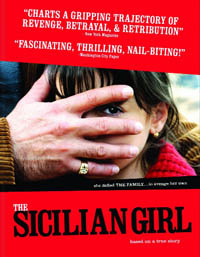DVD Review: The Sicilian Girl

While organized crime has been a longtime curse on society, it's been a longtime blessing for filmmakers. With their inherent bloodiness and intrigue, stories about criminal organizations are tailor-made for big-screen treatments (and, as The Sopranos attests, first-rate small-screen treatments). If the stories are true, so much the better; a typical Mafia-related tale of violence, shifting familial loyalties and vengeance is all the more gripping if it's based on true events.
The Sicilian Girl (now available on DVD) is such a movie, based on the true story of Rita Atria, a Sicilian teenager who dared to break the code of silence about her family's Mafia ties. But its predictable story, weak character development and penchant for dour melodrama make it far less gripping than it could have been.
Atria (called Rita Mancuso in the film, and played by Veronica D'Agostino) was born into a Mafia family in the Sicilian town of Partanna in 1974. As a young girl, she idolized her father, Vito (Michele in the film, played by Marcello Mazzarella), and was devastated at age 11 when a rival Mafia family murdered him. Six years later, her brother, Nicola (Carmelo in the film, played by Carmelo Galati), also was murdered, most likely because he knew the identity of his father's killer and had vowed to avenge his father's death.
Because her brother was a Mafioso also, Rita was privy to a lot of detailed information about the Mafia in her hometown. Distraught over his murder, she committed a stunning act of bravery, especially for a 17-year-old: She told all she knew to Paolo Borsellino, a magistrate with whom she bonded with as a father figure. She described the murderous Partanna Mafia wars and named her father and brother's killers, along with the heads of many powerful Mafia families.
Rita, of course, risked her life by telling the truth. The police gave her a new identity and relocated her to Rome, where she led a secluded and lonely life in a heavily guarded apartment. But her bravery was rewarded with justice: Her testimony, corroborated by other witnesses, led to the arrest and conviction of many Mafiosi and an investigation of Partanna's longtime mayor, Vincenzo Culicchia. To say any more about the story would spoil the third act of The Sicilian Girl and deflate its rare moments of genuine dramatic tension.
The dramatized version of Rita's life is based on her diaries and hews fairly closely to the real story in general terms, although some characters are renamed and differ greatly from their real-life counterparts. It's disappointing, then, that The Sicilian Girl doesn't do justice to its fascinating source material. The film suffers from plodding direction, a largely superficial, hit-the-highlights script and frequently over-the-top acting. The emphasis is on telling what happened, rather than exploring why it happened or what motivates the characters.
Much of the action plays like a tired Mafia drama cliché, with standard-issue scenes of brutal murders, grieving families and vows of revenge. Central to any Mafia-related film are its characters' often tortured family relationships, but The Sicilian Girl barely develops them, focusing instead tepid courtroom drama and Rita's lonesome days in the witness protection program. Compounding the grim, humorless story is The Sicilian Girl's gloomy, misty, perpetually underlit look, which makes the proceedings all the more depressing.
That said, The Sicilian Girl does have some likeable qualities. D'Agostino -- who bears a great resemblance to the real Rita -- carries the film, fleshing out her character whenever the script allows it. She sometimes loses her battle with the film's relentless melodramatics, but she's generally on target and gives the film's most nuanced performance. There are also a few understated, poignant and hopeful moments, such as Rita's sunlit dalliance on a beach with a young man she meets during a rare escape from her bodyguards.
Although I can't recommend The Sicilian Girl for its cinematic qualities, Mafia history buffs might find it interesting, especially when paired with a bit of research into Rita Atria's compelling life story. And audiences who are willing to look beyond the movie's shortcomings may find it inspirational, for it does remind us that there are rare occasions when justice prevails.

